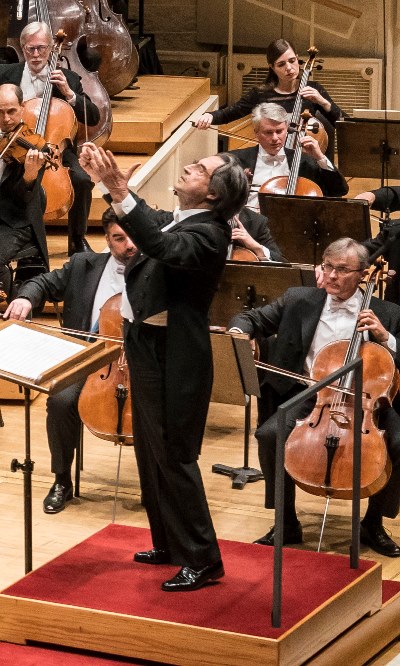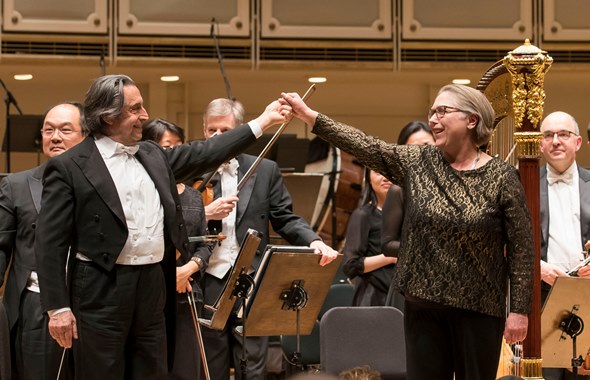Temptation is to say concert was awesome: Muti and CSO send critic deep into thesaurus
Review: Chicago Symphony Orchestra and women of the CSO Chorus, conducted by Riccardo Muti at Orchestra Hall on April 19.
By Lawrence B. Johnson
The concerts one enjoys most can be the hardest to write about – to distill into verbal language the auditory and emotional experience that makes a program of Debussy and Tchaikovsky, to cite the example at hand, especially vivid or remarkable. I mean, one really should try to be a little more specific than “awesome.”
The late conductor Lorin Maazel understood what I’m talking about. Reflecting on his first rehearsal with the Chicago Symphony Orchestra on tour in China back in 2013, Maazel said in an interview: “About an hour into it, I thought to myself, ‘My God, what a sound!’”
 He was speaking of the CSO conjuring the splendor of Brahms’ Second Symphony. But had he heard the band under music director Riccardo Muti on April 19 at Orchestra Hall, summoning the dappled melancholia of Debussy’s “Nocturnes” and the stormy torment of Tchaikovsky’s “Francesca da Rimini,” I can imagine Maazel, a fiercely articulate intellectual, whispering: “Awesome.”
He was speaking of the CSO conjuring the splendor of Brahms’ Second Symphony. But had he heard the band under music director Riccardo Muti on April 19 at Orchestra Hall, summoning the dappled melancholia of Debussy’s “Nocturnes” and the stormy torment of Tchaikovsky’s “Francesca da Rimini,” I can imagine Maazel, a fiercely articulate intellectual, whispering: “Awesome.”
In his eighth season at the Chicago Symphony’s artistic helm, Muti has taken an already formidable ensemble ever closer to the elegance, stylistic precision and ringing authority of his model orchestra, the Vienna Philharmonic. The concert on April 19 bore stunning witness to that.
The three orchestral portraits that form Debussy’s “Nocturnes” might be thought of as troubled dreamscapes: “Nuages” (Clouds) gives the impression of a turbulent sky streaked with light and darkness, while “Fêtes” (Festivals) invokes some revelry beyond the portraitist’s reach and “Sirènes” (Sirens) is the call of a wanton wind, a promise unrequited.
Muti led a performance striking for its fine brushwork: woodwinds that captured tremulous night, brasses that aped some ghostly band just beyond sight and confirmation, strings that wove a background canvas of shimming half-light, of fraught images fleeting and insubstantial. In “Sirens,” the women of the Chicago Symphony Chorus became the fabled enchantresses, their vocalise alluring and evanescent, a wordless wooing not specifically human and yet not to be resisted.
 Almost as an encore, but certainly as a bonus, Muti brought forward the CSO’s principal harp, Sarah Bullen, for an eloquent turn as soloist in Debussy’s “Dances sacred and profane.” What a treat it was to be immersed in Bullen’s fluent playing and opulent sound framed within a handful of string players. It made for a welcome release from the angst-ridden “Nocturnes.”
Almost as an encore, but certainly as a bonus, Muti brought forward the CSO’s principal harp, Sarah Bullen, for an eloquent turn as soloist in Debussy’s “Dances sacred and profane.” What a treat it was to be immersed in Bullen’s fluent playing and opulent sound framed within a handful of string players. It made for a welcome release from the angst-ridden “Nocturnes.”
The concert’s second half was all Tchaikovsky, but far from typical, starting with the tone poem “Francesca da Rimini,” inspired by Dante’s account in his “Divine Comedy” of the illicit and ill-fated love between Francesca and Paolo. If Tchaikovsky’s so-called fantasy-overture “Romeo and Juliet” is more famous, it hardly transcends the dramatic urgency, orchestral vivacity or structural rigor of “Francesca,” a masterpiece that Muti and company delivered with measured power and sheer sonorous brilliance. The woodwinds’ opening evocation of hell’s howling winds could have been played through twice, so thrilling was its chill of the damned.
At the night’s end came the surprise delight of a suite from Tchaikovsky’s ballet “Swan Lake.” Honestly, who woulda thunk it? Was this a pops concert? What was Muti thinking, to conclude all this great music with some ballet tunes? Well, the maestro knew exactly what he was about. This was a showcase for the very CSO sound that had left Maazel speechless.
It’s surely safe to say ballet audiences don’t hear these familiar pieces played the way Muti and the Chicagoans dished them up here – eight episodes of pure sonic opulence, the final four a series of folk dances: Hungarian, Spanish, Neopolitan and Polish. Exhilarating fun, all. But it was the Hungarian dance, with its wild rhythmic pulse and glorious colors that still rang in my head as I made my out into the reluctant spring night. That was the Chicago Symphony under full sail, and it was, to say the least, awesome.


